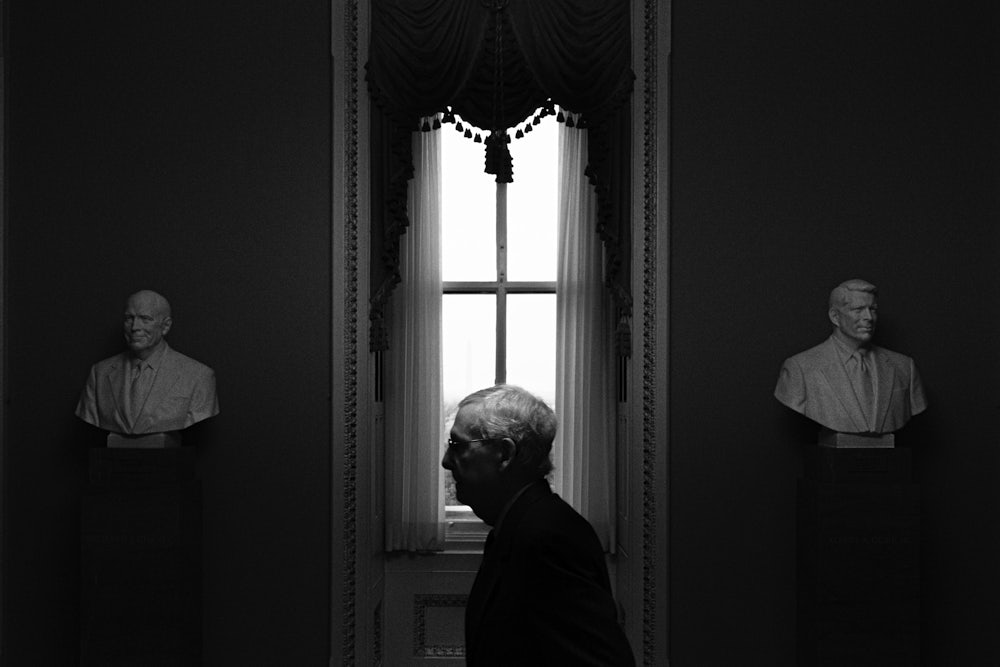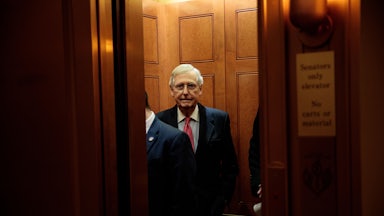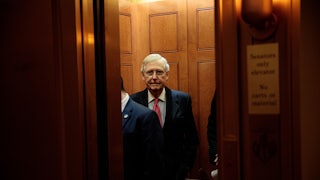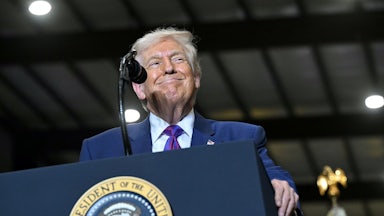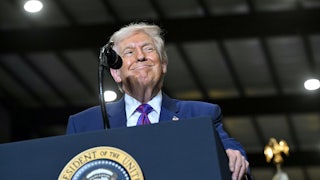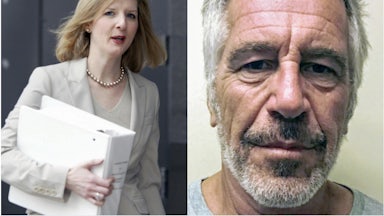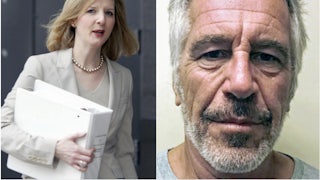Eight years ago, when then–Senate Majority Leader Mitch McConnell used the power of his office to block consideration of President Barack Obama’s Supreme Court nominee for nine months—thus ensuring the nomination and confirmation of three conservative justices by President Donald Trump, reshaping the nation’s highest court for decades to come—it would have been hard to imagine that he would one day be considered by many in his own party to be a moderate who frequently capitulates to Democrats.
But when the longtime Senate Republican leader announced on Wednesday that he would step down from his post this upcoming November, the development was met by some far-right GOP lawmakers with cheers, their enthusiasm matched only by their scorn for McConnell himself. The hardball tactics that he helped to normalize—resulting in some of his party’s greatest legislative victories—have moved beyond his control. The man who once reveled in his reputation as the “Grim Reaper” of Democratic legislative priorities has himself been cut down; in many ways, McConnell is no longer representative of the party he helped shape.
“Believe me, I know the politics within my party at this particular moment in time. I have many faults. Misunderstanding politics is not one of them,” McConnell said in his remarks announcing his decision on Wednesday. “One of life’s most underappreciated talents is to know when it’s time to move on to life’s next chapter.”
Understanding the dynamics of party and politics has long been McConnell’s superpower. Matt Glassman, a senior fellow at Georgetown University’s Government Affairs Institute and a former analyst at the Congressional Research Service, noted that while McConnell did not invent the idea of aggressively wielding minority power as a cudgel, he “more than anyone created the contemporary conditions of the Senate floor.” The era of the filibuster—allowing the minority to determine what gets final votes on the Senate floor—was ushered in by McConnell.
“McConnell’s legacy is the political gambit—that turned out to be correct—that you can play hardball opposition and you won’t be punished by the voters,” Glassman said.
By keeping the Supreme Court as an open issue in the 2016 election, McConnell arguably helped ensure Trump’s election. But despite his overarching loyalty to the party—his willingness to elect more Republicans to the Senate at the expense of nearly all other considerations—the GOP has moved beyond him. Many of the Republicans whose election he recently championed are now his largest critics, such as Senators Josh Hawley, J.D. Vance, Eric Schmitt, and Rick Scott, who unsuccessfully challenged McConnell for party leader earlier this year. (In 2018, the super PAC affiliated with McConnell spent more than $20 million to support Hawley, who on Wednesday complained to reporters about McConnell that “no one has done more than him to flood this chamber and our politics with corporate cash.”)
McConnell’s relationship with Trump was never overly warm, although the Republican leader helped ensure some of the president’s greatest victories—the establishment of a conservative majority in the Supreme Court and the passage of massive tax cut legislation among them. Despite his personal distaste for Trump in the wake of the January 6 attack on the U.S. Capitol, McConnell ensured that the impeachment trial on charges of inciting insurrection would occur after Trump left office—thereby granting his fellow Republicans sufficient political cover to vote to acquit. McConnell himself voted not to convict the former president. McConnell has not uttered Trump’s name in years, their relationship further strained by the latter’s penchant for making racist remarks about McConnell’s wife, Elaine Chao, herself a former Trump Cabinet official.
The most significant break between the two men was spurred by Russia’s invasion of Ukraine in 2022. McConnell has been a steadfast supporter of Ukraine, urging for the approval of continued aid to the country. Meanwhile, GOP lawmakers with a more Trumpian view of foreign policy have pushed against the approval of more assistance to Ukraine, with the former president’s support.
McConnell’s support for Ukraine has greatly alienated him from much of the party. “Our thoughts are with our Democrat colleagues in the Senate on the retirement of their Co-Majority Leader Mitch McConnell (D-Ukraine),” read a Wednesday social media post by the Freedom Caucus, the far-right obstructionist faction of the House GOP, referring to McConnell’s staunch support for Ukraine in its conflict with Russia.
GOP Representative Chip Roy, a member of the Freedom Caucus who has complained about the lack of Republican accomplishments in this Congress, said that McConnell was “trying to finish his legacy” with support for Ukraine in a way that was incompatible with the American public.
“The American people want to see the border secured, they want to see a stop to racking up debt, they want to see us constrain a government that is interfering with our lives and squelching economic growth and opportunity here,” argued Roy. “Doesn’t mean that we can’t have a healthy debate about what we do in Ukraine. It just means you can’t prioritize it. And McConnell very clearly is in the group that prioritizes it.”
That criticism was echoed in the Senate as well. Senator Mike Lee, a frequent conservative critic of McConnell, wrote on X that “the next Senate GOP leader should care more about our border security than Ukraine’s.” Vance told reporters that he wants a leader “who is more concerned about the American border than they are about what’s going on 6,000 miles away.”
McConnell’s disconnect with Trump is also seen as a problem for many of his critics. “I’d just settle for a functioning relationship,” said Hawley, adding that McConnell has “actively undermined Trump.” The potential contenders to replace McConnell have already started to shore up their relationship with the former president—Senator John Cornyn, the only declared candidate thus far, has endorsed Trump, as have other members of Republican leadership.
As polarization has deepened across the country and in Congress, any bipartisan compromise is inherently viewed with suspicion by much of the Republican Party. This is particularly apparent in the House, where the faction of recalcitrant far-right members is larger and more powerful. But it is increasingly true in the Senate as well.
“McConnell was a brawler, and he was more than willing to play hardball,” said Glassman, but the longtime Republican leader has also been willing to occasionally reach across the aisle when he needs to do so—a recent example being with government funding. “Legislative leaders ultimately have to cut deals at some point,” Glassman said.
There are many Republicans for whom that very willingness to occasionally reach bipartisan consensus was an example of his consummate leadership, not some tendency toward capitulation. Republican Senator Thom Tillis argued that McConnell often took punches on behalf of his membership, which naturally resulted in criticism from members of his conference. “If you’re Chuck Schumer, or you’re Mitch McConnell, you’re either too conservative, or you’re too liberal. That’s part of the job,” said Tillis, referring to the Democratic majority leader.
That argument was echoed by GOP Senator Kevin Cramer. “To me, that’s the real legacy, is just how to be a leader, and be able to take the slings and arrows meant for all of us so that the rest of us don’t have to take on. It’s selfless,” he said.
Cramer bristled at the implication from some Republicans that McConnell capitulates to Democrats too frequently. “The definition of conservatism for them has changed. For them, it’s not conservatism but populism. And it’s not construction, it’s destruction. And it’s not making things better, it’s just making sure that nothing happens,” said Cramer. “Quite honestly, shame on them. I mean, the guy has just done what they’ve wanted him to do for a long time.”
